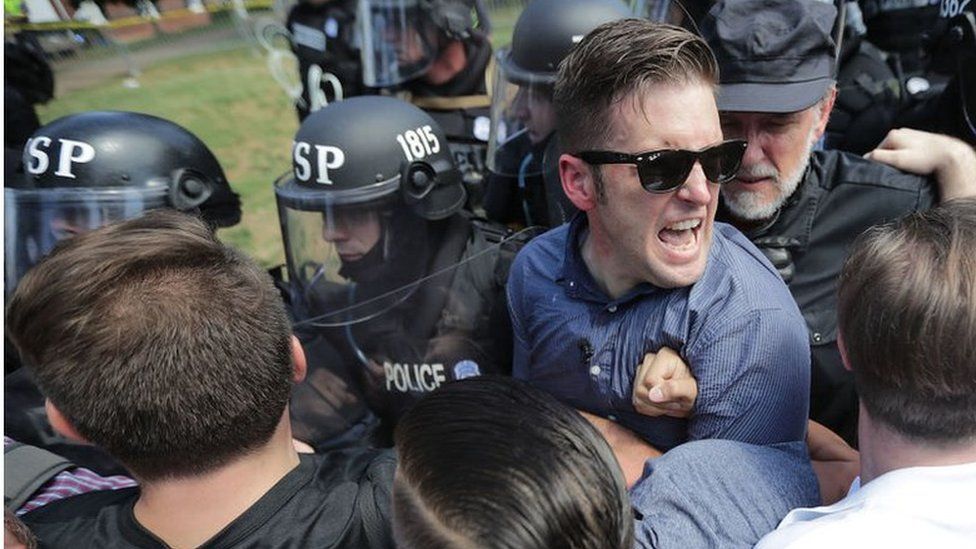Those injured in Charlottesville accused organisers of conspiring to commit racially motivated violence.

Image source, Getty Images
A US jury has awarded millions in damages against the organisers of a deadly far-right rally in August 2017.
The defendants were found liable in four out of six counts over the bloodshed at the Unite the Right rally in Charlottesville, Virginia.
Nine of those injured sued the event’s organisers arguing they had conspired to commit racially motivated violence.
A woman was killed and dozens were hurt after an avowed neo-Nazi drove a car into counter-protesters.
The total damages awarded amount to $25m (£19m), according to US media.
In court, the jury awarded $500,000 in punitive damages against 12 defendants, and $1m against five white supremacist organisations. Punitive damages are awarded at a court’s discretion to punish a defendant for conduct judged to be especially harmful.
Additionally, the jury awarded $250,000 in compensatory damages to two plaintiffs and $200,000 against several defendants.
A total of $12m in punitive damages was also imposed against the driver of the car in the fatal incident.
The lawsuit alleged that the defendants “brought with them to Charlottesville the imagery of the Holocaust, of slavery, of Jim Crow and of fascism”.
“They also brought with them semi-automatic weapons, pistols, mace, rods, armour, shields and torches,” the lawsuit said.
The defendants include several prominent figures in America’s white nationalist and far-right sphere.
Among those found liable in the case were Jason Kessler, the rally’s main organiser, and Richard Spencer, who coined the term “alt-right” and spoke at the event.
Another defendant, Christopher Cantwell, became famous as “the crying Nazi” after an emotional YouTube video he posted after the rally went viral.
The lawsuit largely rested on an 1871 law passed after the US Civil War to protect black Americans following their emancipation from slavery from the Ku Klux Klan.
It allows private citizens to sue others believed to have committed civil rights violations – with the condition that the plaintiffs must prove that they conspired to do so.
Attorneys for the plaintiffs also collected more than 5.3 terabytes of data to help them make their case, including social media posts and chat exchanges.
The rally began as a protest against the removal of a Confederate statue.
Then-President Donald Trump came under fire after saying afterwards that there were “very fine people on both sides”. In the same speech he also said neo-Nazis and white nationalists “should be condemned totally”.
A counter-protester, 32-year-old Heather Heyer, was killed when James Alex Fields drove his car into a crowd. He was sentenced to life in prison in June 2019.
The civil case included testimony from survivors of the incident.
“It was a complete terror scene. It was blood everywhere,” one of the plaintiffs, Marissa Blair, testified. “I was terrified.”
The defendants sought to distance themselves from the violence and maintained that there was no conspiracy. They said none of them knew Fields and so they could not have predicted he would ram a vehicle into a crowd.
“None of these defendants could have foreseen what James Fields did,” Mr Kessler’s attorney said.
The defendants argued that their racist views were protected by the First Amendment of the US Constitution, which guarantees free speech.
They also said they had acted in self-defense and that the police bore responsibility for failing to keep the two sides from fighting.
Court testimony, however, suggested that some of the organisers had foreseen violence.
Former extremist Samantha Froelich, for example, testified that the idea of using vehicles to target counter-protesters was discussed ahead of the event.
Attorneys for the plaintiffs have said they hope the lawsuit acts as a deterrent against further extremist rallies.
Amy Spitalnick, executive director of Integrity First for America, which backed the legal action, told the BBC in October that “a case like this can also have much broader impacts in making clear there will be very real consequences for violence extremism”.